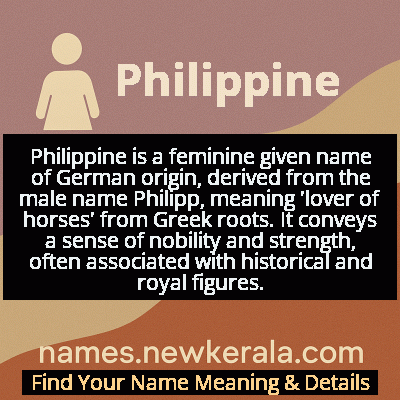Philippine Name Meaning & Details
Origin, Popularity, Numerology Analysis & Name Meaning of Philippine
Discover the origin, meaning, and cultural significance of the name PHILIPPINE. Delve into its historical roots and explore the lasting impact it has had on communities and traditions.
Name
Philippine
Gender
Female
Origin
German
Lucky Number
6
Meaning of the Name - Philippine
Philippine is a feminine given name of German origin, derived from the male name Philipp, meaning 'lover of horses' from Greek roots. It conveys a sense of nobility and strength, often associated with historical and royal figures.
Philippine - Complete Numerology Analysis
Your Numerology Number
Based on Pythagorean Numerology System
Ruling Planet
Venus
Positive Nature
Harmonious, responsible, caring, and artistic.
Negative Traits
Overly idealistic, superficial, possessive, or jealous.
Lucky Colours
Pink, turquoise.
Lucky Days
Friday.
Lucky Stones
Diamond, turquoise.
Harmony Numbers
2, 3, 9.
Best Suited Professions
Artists, musicians, teachers, healthcare workers.
What People Like About You
Warmth, nurturing nature, artistic flair.
Famous People Named Philippine
Philippine von Redern
German noblewoman
Prominent social figure in Prussian aristocracy, known for her patronage of the arts
Philippine Engel
German actress
Notable stage and film actress in German theater during the 1920s-1930s
Philippine von Edelsberg
Austrian noblewoman
Known for her equestrian skills and horse breeding programs
Philippine Welser
German noblewoman
Famous for her secret marriage to Archduke Ferdinand II of Austria and her medical knowledge
Name Variations & International Equivalents
Click on blue names to explore their detailed meanings. Gray names with will be available soon.
Cultural & Historical Significance
In the 18th and 19th centuries, Philippine experienced a revival during the Romantic period when there was renewed interest in classical names and Germanic heritage. The name became symbolic of both traditional values and the emerging ideals of feminine strength and independence. Its usage often indicated family connections to land ownership, military service, or aristocratic lineage where horse breeding and equestrian sports were important social markers. The name's cultural significance extends beyond Germany to Austria, Switzerland, and other German-speaking regions, where it maintains its aristocratic connotations while also representing a connection to nature and traditional rural values.
Extended Personality Analysis
Individuals named Philippine typically exhibit a unique blend of strength, elegance, and deep emotional intelligence. The name's equestrian meaning often manifests in personality characteristics such as remarkable endurance, graceful leadership, and a natural affinity for challenges. Like the horses their name honors, Philippines tend to be both powerful and sensitive—capable of great strength when needed but equally attuned to subtle emotional currents. They often demonstrate exceptional loyalty to their loved ones and causes they believe in, much like the steadfast companionship horses have provided humans throughout history.
Their personality typically combines traditional values with progressive thinking, creating individuals who respect heritage while embracing innovation. Philippines are often natural leaders who inspire others through both their determination and their compassion. They tend to be excellent communicators who can navigate complex social situations with diplomacy and grace. The name's Germanic roots also suggest qualities of reliability, practicality, and a strong work ethic—traits that serve them well in both personal and professional contexts. Their connection to the name's symbolic meaning often gives them a special appreciation for nature, animals, and outdoor activities, particularly those involving horses or other equestrian pursuits.
Modern Usage & Popularity
In contemporary naming practices, Philippine maintains its status as a distinctive and elegant choice, though it remains relatively uncommon compared to more popular German female names. Its usage is primarily concentrated in German-speaking countries, particularly among families with aristocratic connections or those seeking to honor Germanic heritage. While it peaked in popularity during the late 19th and early 20th centuries, recent years have seen a modest revival as part of the broader trend toward vintage and historically significant names. Modern parents choosing Philippine often appreciate its strong feminine qualities, elegant sound, and the positive symbolism associated with horses—representing freedom, strength, and grace. The name is particularly favored in southern Germany, Austria, and among German-speaking communities where traditional names are experiencing renewed interest. Current usage often pairs it with more contemporary middle names to create a balance between tradition and modernity, making it an appealing choice for parents seeking a name that is both distinctive and meaningful.
Symbolic & Spiritual Meanings
The name Philippine carries profound symbolic meanings that extend far beyond its literal translation of 'lover of horses.' Symbolically, it represents the harmonious union of strength and sensitivity—the powerful grace of a horse combined with the deep emotional capacity of a devoted lover. In many cultures, horses symbolize freedom, journey, and noble spirit, while the concept of 'loving' adds dimensions of passion, commitment, and emotional depth. The name thus symbolizes someone who approaches life's journey with both powerful determination and heartfelt connection. In Germanic symbolism specifically, Philippine represents traditional values, endurance, and the ability to navigate life's challenges with both practical wisdom and emotional intelligence. The equestrian association also connects to themes of partnership and trust—the special bond between rider and horse that requires mutual respect and understanding. This makes the name symbolic of balanced relationships, whether personal, professional, or spiritual, where strength and sensitivity work in perfect harmony to create meaningful progress and deep connections.

